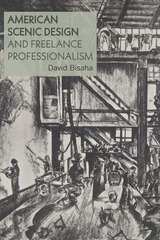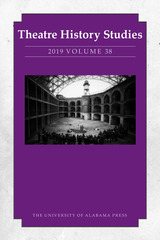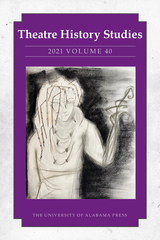4 books about Bisaha, David

American Scenic Design and Freelance Professionalism
David Bisaha
Southern Illinois University Press, 2022
An inclusive history of the professionalization of American scenic design
The figure of the American theatrical scenic designer first emerged in the early twentieth century. As productions moved away from standardized, painted scenery and toward individualized scenic design, the demand for talented new designers grew. Within decades, scenic designers reinvented themselves as professional artists. They ran their own studios, proudly displayed their names on Broadway playbills, and even appeared in magazine and television profiles.
American Scenic Design and Freelance Professionalism tells the history of the field through the figures, institutions, and movements that helped create and shape the profession. Taking a unique sociological approach, theatre scholar David Bisaha examines the work that designers performed outside of theatrical productions. He shows how figures such as Lee Simonson, Norman Bel Geddes, Jo Mielziner, and Donald Oenslager constructed a freelance, professional identity for scenic designers by working within their labor union (United Scenic Artists Local 829), generating self-promotional press, building university curricula, and volunteering in wartime service.
However, while new institutions provided autonomy and intellectual property rights for many, women, queer, and Black designers were not always welcome to join the organizations that protected freelance designers’ interests. Among others, Aline Bernstein, Emeline Roche, Perry Watkins, Peggy Clark, and James Reynolds were excluded from professional groups because of their identities. They nonetheless established themselves among the most successful designers of their time. Their stories expand the history of American scenic design by showing how professionalism won designers substantial benefits, yet also created legacies of exclusion with which American theatre is still reckoning.
The figure of the American theatrical scenic designer first emerged in the early twentieth century. As productions moved away from standardized, painted scenery and toward individualized scenic design, the demand for talented new designers grew. Within decades, scenic designers reinvented themselves as professional artists. They ran their own studios, proudly displayed their names on Broadway playbills, and even appeared in magazine and television profiles.
American Scenic Design and Freelance Professionalism tells the history of the field through the figures, institutions, and movements that helped create and shape the profession. Taking a unique sociological approach, theatre scholar David Bisaha examines the work that designers performed outside of theatrical productions. He shows how figures such as Lee Simonson, Norman Bel Geddes, Jo Mielziner, and Donald Oenslager constructed a freelance, professional identity for scenic designers by working within their labor union (United Scenic Artists Local 829), generating self-promotional press, building university curricula, and volunteering in wartime service.
However, while new institutions provided autonomy and intellectual property rights for many, women, queer, and Black designers were not always welcome to join the organizations that protected freelance designers’ interests. Among others, Aline Bernstein, Emeline Roche, Perry Watkins, Peggy Clark, and James Reynolds were excluded from professional groups because of their identities. They nonetheless established themselves among the most successful designers of their time. Their stories expand the history of American scenic design by showing how professionalism won designers substantial benefits, yet also created legacies of exclusion with which American theatre is still reckoning.
[more]

Theatre History Studies 2019, Vol. 38
Edited by Sara Freeman
University of Alabama Press, 2019
Theatre History Studies (THS) is a peer-reviewed journal of theatre history and scholarship published annually since 1981 by the Mid-America Theatre Conference
THEATRE HISTORY STUDIES, VOLUME 38
PART I: Studies in Theatre History
ELIZABETH COEN
Hanswurst’s Public: Defending the Comic in the Theatres of Eighteenth-Century Vienna
BRIDGET MCFARLAND
“This Affair of a Theatre”: The Boston Theatre Controversy and the Americanization of the Stage
RYAN TVEDT
From Moscow to Simferopol: How the Russian Cubo-Futurists Accessed the Provinces
DANIELLA VINITSKI MOONEY
So Long Ago I Can’t Remember: GAle GAtes et al. and the 1990s Immersive Theatre
Part II: The Site-Based Theatre Audience Experience: Dramaturgy and Ethics
—EDITED BY PENELOPE COLE AND RAND HARMON
PENELOPE COLE
Site-Based Theatre: The Beginning
PENELOPE COLE
Becoming the Mob: Mike Brookes and Mike Pearson’s Coriolan/us
SEAN BARTLEY
A Walk in the Park: David Levine’s Private Moment and Ethical Participation in Site-Based Performance
DAVID BISAHA
“I Want You to Feel Uncomfortable”: Adapting Participation in A 24-Decade History of Popular Music at San Francisco’s Curran Theatre
COLLEEN RUA
Navigating Neverland and Wonderland: Audience as Spect-Character
GUILLERMO AVILES-RODRIGUEZ, PENELOPE COLE, RAND HARMON, AND ERIN B. MEE
Ethics and Site-Based Theatre: A Curated Discussion
PART III: The Robert A. Schanke Award-Winning Essay from the 1038 Mid-America Theatre Conference
MICHELLE GRANSHAW
Inventing the Tramp: The Early Tramp Comic on the Variety Stage
THEATRE HISTORY STUDIES, VOLUME 38
PART I: Studies in Theatre History
ELIZABETH COEN
Hanswurst’s Public: Defending the Comic in the Theatres of Eighteenth-Century Vienna
BRIDGET MCFARLAND
“This Affair of a Theatre”: The Boston Theatre Controversy and the Americanization of the Stage
RYAN TVEDT
From Moscow to Simferopol: How the Russian Cubo-Futurists Accessed the Provinces
DANIELLA VINITSKI MOONEY
So Long Ago I Can’t Remember: GAle GAtes et al. and the 1990s Immersive Theatre
Part II: The Site-Based Theatre Audience Experience: Dramaturgy and Ethics
—EDITED BY PENELOPE COLE AND RAND HARMON
PENELOPE COLE
Site-Based Theatre: The Beginning
PENELOPE COLE
Becoming the Mob: Mike Brookes and Mike Pearson’s Coriolan/us
SEAN BARTLEY
A Walk in the Park: David Levine’s Private Moment and Ethical Participation in Site-Based Performance
DAVID BISAHA
“I Want You to Feel Uncomfortable”: Adapting Participation in A 24-Decade History of Popular Music at San Francisco’s Curran Theatre
COLLEEN RUA
Navigating Neverland and Wonderland: Audience as Spect-Character
GUILLERMO AVILES-RODRIGUEZ, PENELOPE COLE, RAND HARMON, AND ERIN B. MEE
Ethics and Site-Based Theatre: A Curated Discussion
PART III: The Robert A. Schanke Award-Winning Essay from the 1038 Mid-America Theatre Conference
MICHELLE GRANSHAW
Inventing the Tramp: The Early Tramp Comic on the Variety Stage
[more]

Theatre History Studies 2021, Vol 40
Edited by Lisa Jackson-Schebetta
University of Alabama Press, 2021
A peer-reviewed journal of theatre history and scholarship published annually since 1981 by the Mid-America Theatre Conference
Introduction
—LISA JACKSON-SCHEBETTA, WITH ODAI JOHNSON, CHRYSTYNA DAIL, AND JONATHAN SHANDELL
PART I
STUDIES IN THEATRE HISTORY
Un-Reading Voltaire: The Ghost in the Cupboard of the House of Reason
—ODAI JOHNSON
Caricatured, Marginalized,
and Erased: African American Artists and Philadelphia’s Negro Unit of the FTP, 1936–1939
—JONATHAN SHANDELL
Stop Your Sobbing: White Fragility, Slippery Empathy, and Historical Consciousness in Branden Jacobs-Jenkins’s Appropriate
—SCOTT PROUDFIT
Asia and Alwin Nikolais: Interdisciplinarity, Orientalist Tendencies, and Midcentury American Dance
—ANGELA K. AHLGREN
PART II
WITCH CHARACTERS AND WITCHY PERFORMANCE
Editor’s Introduction to the Special Section
Shifting Shapes: Witch Characters and Witchy Performances
—CHRYSTYNA DAIL
To Wright the Witch: The Case of Joanna Baillie’s Witchcraft
—JANE BARNETTE
Nothing Wicked This Way Comes: Shakespeare’s Subversion of Archetypal Witches in The Winter’s Tale
—JESSICA HOLT
Of Women and Witches: Performing the Female Body in Caryl Churchill’s Vinegar Tom
—MAMATA SENGUPTA
(Un)Limited: The Influence of Mentorship and Father-Daughter Relationships on Elphaba’s Heroine Journey in Wicked
—REBECCA K. HAMMONDS
Immersive Witches: New York City under the Spell of Sleep No More and Then She Fell
—DAVID BISAHA
PART III
Essay from the Conference
The Robert A. Schanke Award-Winning Essay, MATC 2020
New Conventions for a New Generation: High School Musicals and Broadway in the 2010s
—LINDSEY MANTOAN
Introduction
—LISA JACKSON-SCHEBETTA, WITH ODAI JOHNSON, CHRYSTYNA DAIL, AND JONATHAN SHANDELL
PART I
STUDIES IN THEATRE HISTORY
Un-Reading Voltaire: The Ghost in the Cupboard of the House of Reason
—ODAI JOHNSON
Caricatured, Marginalized,
and Erased: African American Artists and Philadelphia’s Negro Unit of the FTP, 1936–1939
—JONATHAN SHANDELL
Stop Your Sobbing: White Fragility, Slippery Empathy, and Historical Consciousness in Branden Jacobs-Jenkins’s Appropriate
—SCOTT PROUDFIT
Asia and Alwin Nikolais: Interdisciplinarity, Orientalist Tendencies, and Midcentury American Dance
—ANGELA K. AHLGREN
PART II
WITCH CHARACTERS AND WITCHY PERFORMANCE
Editor’s Introduction to the Special Section
Shifting Shapes: Witch Characters and Witchy Performances
—CHRYSTYNA DAIL
To Wright the Witch: The Case of Joanna Baillie’s Witchcraft
—JANE BARNETTE
Nothing Wicked This Way Comes: Shakespeare’s Subversion of Archetypal Witches in The Winter’s Tale
—JESSICA HOLT
Of Women and Witches: Performing the Female Body in Caryl Churchill’s Vinegar Tom
—MAMATA SENGUPTA
(Un)Limited: The Influence of Mentorship and Father-Daughter Relationships on Elphaba’s Heroine Journey in Wicked
—REBECCA K. HAMMONDS
Immersive Witches: New York City under the Spell of Sleep No More and Then She Fell
—DAVID BISAHA
PART III
Essay from the Conference
The Robert A. Schanke Award-Winning Essay, MATC 2020
New Conventions for a New Generation: High School Musicals and Broadway in the 2010s
—LINDSEY MANTOAN
[more]

Theatre History Studies 2024, Vol 43
Edited by Jocelyn L. Buckner
University of Alabama Press, 2025
The official journal of the Mid-America Theatre Conference
[more]
READERS
Browse our collection.
PUBLISHERS
See BiblioVault's publisher services.
STUDENT SERVICES
Files for college accessibility offices.
UChicago Accessibility Resources
home | accessibility | search | about | contact us
BiblioVault ® 2001 - 2024
The University of Chicago Press









